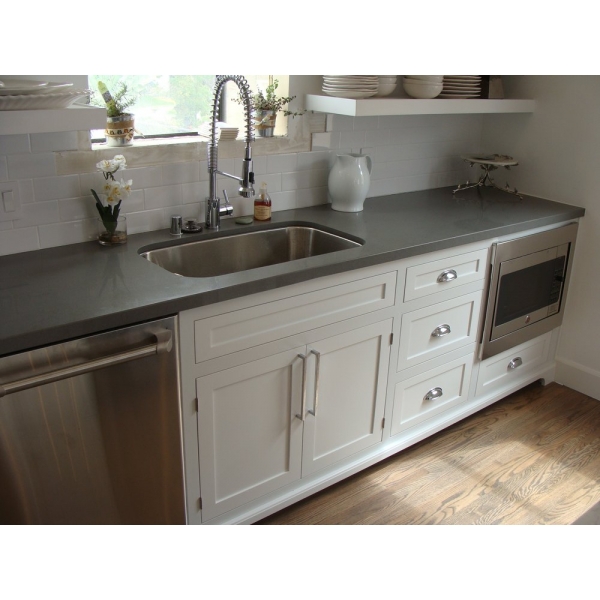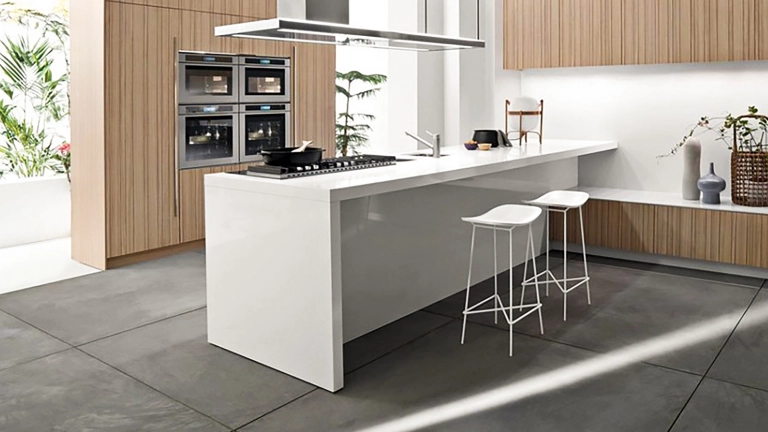Choosing the right countertop for your kitchen or bathroom is more than just a design decision; it's an investment in the functionality and longevity of your space. With so many options available, it’s easy to feel overwhelmed. Quartz, marble, and granite are three of the most popular materials, each with its own set of strengths and weaknesses.
But how do they truly compare when it comes to durability, aesthetics, and maintenance? Whether you're renovating your home or building from scratch, understanding these differences will help you make the best choice for your lifestyle and budget. Let's dive into a detailed comparison of these countertop heavyweights to see which one stands out for you.
Durability is often the first consideration for homeowners. After all, your countertop will face a lot of daily wear and tear.
● Quartz: Quartz countertops are engineered from crushed quartz stone mixed with resin. This makes them incredibly durable, resistant to scratches, and less prone to chipping. Because quartz is non-porous, it doesn’t absorb liquids, which means it’s highly resistant to stains and bacteria growth. If you have a busy kitchen or a family with kids, quartz countertops can handle the daily challenges without showing signs of wear.
● Marble: Marble is a natural stone that exudes elegance, but it's not as durable as quartz. Marble is softer and more porous, making it susceptible to scratches, chips, and stains. Spills from acidic substances like wine or citrus can etch the surface, leaving dull spots. Marble countertops can last for decades, but they require extra care and maintenance to keep them looking pristine.
● Granite: Granite is another natural stone and is known for its durability. It’s harder than marble and resistant to scratches and heat. However, like marble, granite is porous and can absorb liquids if not properly sealed. This can lead to staining or bacterial growth in the tiny crevices. Regular sealing can mitigate these issues, but it’s something to keep in mind if you prefer a low-maintenance option.

The appearance of your countertop is a personal choice and plays a significant role in setting the tone of your space.
● Quartz: Quartz offers a wide variety of colors and patterns because it is engineered. You can find quartz countertops that mimic the look of natural stone, such as marble or granite, or opt for something more contemporary. The uniformity in quartz patterns is ideal for those who prefer a consistent look throughout their kitchen or bathroom. Additionally, quartz countertops don’t have the flaws that sometimes appear in natural stone, such as cracks or fissures, giving you a flawless finish.
● Marble: Marble is synonymous with luxury. Its natural veining and unique patterns are unmatched, giving each slab a one-of-a-kind appearance. Marble’s timeless beauty can elevate any space, making it a popular choice for those who want to make a statement. However, the variability in its patterns means that no two marble countertops will look exactly alike, which could be a pro or a con depending on your preferences.
● Granite: Granite offers a blend of natural beauty and durability. Each slab is unique, with its patterns and colors determined by the minerals found within the stone. Granite comes in a wide range of colors, from deep blacks to light pinks, making it versatile for different design aesthetics. Like marble, granite has natural veining and patterns that add character to any space.
How much time and effort are you willing to invest in maintaining your countertops? This is a crucial question when choosing between quartz, marble, and granite.
● Quartz: Quartz is the easiest of the three to maintain. Its non-porous surface means you don’t have to worry about sealing it, and it’s resistant to stains and bacteria. A simple wipe with a mild detergent and water is usually enough to keep quartz countertops looking their best. Because it’s resistant to scratches and chips, you won’t need to worry about repairs often, making quartz a low-maintenance option.
● Marble: Marble requires more maintenance to preserve its beauty. It needs to be sealed regularly to prevent staining, and even then, you’ll need to be cautious with spills. Acidic substances, as mentioned earlier, can etch the surface, so it’s important to clean up spills immediately. Marble can also be susceptible to scratches, so using cutting boards and avoiding heavy impacts is essential. If you’re willing to put in the effort, marble can be a stunning addition to your home.
● Granite: Granite requires periodic sealing to protect it from stains and bacteria. However, it’s generally more forgiving than marble. Regular cleaning with mild soap and water will keep it in good condition. Granite is heat resistant, so you don’t need to worry about placing hot pans directly on the surface. That said, granite can still chip or crack if subjected to heavy impact, so some care is necessary.

Your budget plays a big role in the decision-making process. While all three materials can be considered high-end options, there are differences in cost.
● Quartz: Quartz countertops tend to be more expensive than granite but less expensive than marble. The cost of quartz can vary depending on the brand and design, but you’re generally looking at a higher upfront investment. However, because quartz is so low-maintenance and durable, you might save money in the long run on repairs and upkeep.
● Marble: Marble is typically the most expensive of the three options. Its high price reflects its luxurious appearance and the effort required to quarry and process it. If you have your heart set on marble, be prepared for the investment not only in the initial cost but also in ongoing maintenance.
● Granite: Granite offers a wide range of pricing, making it more accessible to various budgets. The cost of granite depends on the rarity of the color and pattern. Some granite slabs can be quite affordable, while others, especially those with rare patterns, can be as expensive as marble. Granite strikes a good balance between cost, beauty, and durability, making it a popular choice.
In today’s world, many homeowners are concerned about the environmental impact of their choices.
● Quartz: Quartz countertops are engineered, so they require energy and resources to produce. However, many quartz manufacturers use sustainable practices and recycled materials, which can reduce the overall environmental impact. Quartz is also long-lasting, which means it won’t need to be replaced as often, reducing waste.
● Marble: Marble is a natural stone, so its extraction and processing have a significant environmental impact. Quarrying marble involves heavy machinery, and the process can be destructive to the landscape. Additionally, marble isn’t as long-lasting as quartz or granite, which means it may need to be replaced sooner, leading to more waste.
● Granite: Granite also has an environmental impact due to the quarrying process. However, like quartz, granite is extremely durable and long-lasting, reducing the need for replacement. Some companies now offer more sustainable quarrying practices, so it’s worth researching the source of the granite to ensure it aligns with your environmental values.
When it comes to choosing between quartz, marble, and granite countertops, there’s no one-size-fits-all answer. Quartz offers unmatched durability and ease of maintenance, making it ideal for busy households. Marble provides timeless elegance and beauty, but it requires more care and comes with a higher price tag. Granite strikes a balance between durability, aesthetics, and cost, making it a versatile choice for many homeowners.
Your decision should ultimately be based on your lifestyle, budget, and design preferences. Whether you prioritize durability, aesthetics, or environmental impact, understanding the pros and cons of each material will help you make an informed choice that you'll love for years to come.
For more information on quartz countertops and to explore our range of products, visit our website at GELANDY.